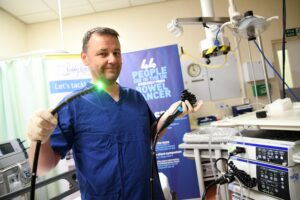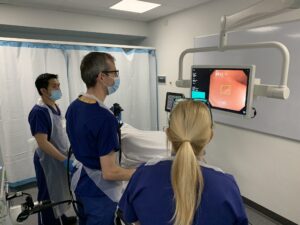INNOVATIVE BOWEL CANCER RESEARCH UNDERWAY
In 2019, thanks to your fantastic support, we announced £985,000 in funding for a ground-breaking bowel cancer research and treatment project called COLO-SPEED.
COLO-SPEED aims to recruit more patients – up to 5,000 a year – to sign up to participate in research via regional NHS endoscopy units across the North East and Cumbria.
It also provides essential tools to support research projects via a novel digital platform, collecting data, feeding back results and delivering ongoing patient and public engagement.
The ultimate objective of COLO-SPEED is to speed up research into the disease and help reverse the region’s high incidence and low survival rates of bowel cancer.
Despite a challenging start due to the pandemic, the benefits of COLO-SPEED are now being felt and the first industry funded trial to source participants through it is well underway and making a positive difference.
An initial 500 patients are now taking part in a UK first, the clinical trial of an innovative artificial intelligence (AI) device designed to help clinicians to identify polyps during colonoscopies – examinations used to detect changes or abnormalities in the bowel.
Led by South Tyneside and Sunderland NHS Foundation Trust, nine regional endoscopy units, including Newcastle Hospitals, are taking part in the ground-breaking study, which is called COLO-DETECT and is trialling the use of GI Genius – a new AI device.
Most bowel cancers develop from a type of polyp, called an adenoma, that becomes cancerous. It is important to find as many polyps as possible to decide whether they need to be removed, as this may prevent a polyp becoming cancerous in the future.
GI Genius integrates with existing colonoscopy equipment and analyses images from the camera in real-time. It highlights any areas it thinks may contain a polyp, these areas can then be inspected more closely to determine if a polyp is present and whether or not it should be removed.
The £896,000 COLO-DETECT trial has been funded by Medtronic and will be recruiting more than 2,000 patients over the next 12 months though COLO-SPEED.
Both COLO-SPEED and COLO-DETECT are led by Professor Colin Rees, a consultant gastroenterologist at South Tyneside and Sunderland NHS Foundation Trust, professor of gastroenterology at Newcastle University and one of Europe’s leading experts in endoscopy – the procedure used to diagnose most forms of bowel cancer.
He is working closely alongside Professor Linda Sharp, Professor of Cancer Epidemiology at Newcastle University.
Professor Rees, said: “Bowel cancer rates are very high in the North East – men in this region have the highest bowel cancer incidence rates in England with women also in the upper half of incidence rates.
“Sadly, survival rates for men and women in the North East are also amongst the lowest in the country and the survival rates in the UK are lower than in many other European countries. We want to reduce the number of deaths by diagnosing disease in the bowel before it even becomes cancerous and by finding cancer earlier.”
COLO-DETECT is the first major industry study attracted to the North East through the COLO-SPEED network. COLO-SPEED will also enable the project’s delivery more efficiently than would have previously been the case.
Lady Elsie said: “When my husband first launched this Foundation, his aim was to attract world-class cancer research to this region, which would then go on to help across the country and beyond.
“We’re so proud to see this starting with help from COLO-SPEED and I know our charity’s wonderful supporters will join me in wishing everyone involved all the very best. We all want to see research into this disease progressing as quickly as possible.”
For more information about COLO-SPEED, please visit: https://colospeed.uk/





